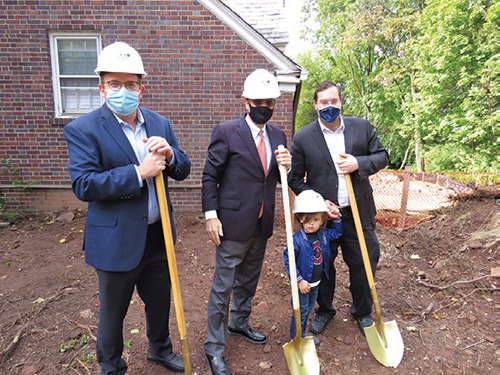


The Passaic-Clifton community and local officials gathered—while observing COVID guidelines—this past Sunday to celebrate the start of construction on the new shul and mikvah building in the heart of the Clifton Jewish community.
“It’s a long-awaited day,” said Rabbi Schachne Weinberger, rabbi of the shul, K’hal Tiferes Boruch. “It’s a much-needed place for the local community to daven that is close to home.”
Carefully spaced chairs on the spacious lawn overlooked the building site that will become the new shul, currently a massive hole in the ground awaiting the concrete pouring. The large crowd wore masks and observed social distancing. Among the guests were town officials including Mayor James Anzaldi, Assemblyman Gary Schaer, Councilman Ray Grabowsky, Councilwoman Lauren Murphy and Councilman Peter Eagler.
The shul’s struggles to reach this milestone gained national attention due to its yearslong legal battle with the City of Clifton zoning board, which was first reported in in The Jewish Link and picked up by other news media in January 2019 (https://www.jns.org/new-jersey-shul-wins-2-5-million-in-landmark-religious-discrimination-case/).
The property was purchased in 2005. The shul’s leadership submitted plans well within zoning guidelines and, unlike most shuls, did not even request a variance, yet they were denied again and again. They were required to hire expensive experts to prove they were compliant in common matters such as the amount of water pressure needed for fire safety, and they were told that their proposed parking lot wasn’t the right size.
“Fifteen variances were made up, and we needed meetings to disprove each one. Each step introduced more and more delay,” said Duvy Gross, the shul president.
Ultimately, the shul won. The city’s delays were a clear violation of the Religious Land Use and Institutionalized Persons Act (RLUIPA). The shul was reimbursed with a $2.5 million settlement for its incurred expenses (including hiring lawyers and experts, paying taxes on the property due to it not yet being an exempt house of worship, and other outlays).
“When we started, I knew there could be some obstacles in our path, but I didn’t think they all would be there,” said Gross. “I feel euphoric. The battle was long and taxing, but now, here we are.”
Schaer spoke in support of the new shul and its potential to benefit the greater community. “This day is a culmination of so many dreams,” he said. “Today is not only a new shul, but a new shul in Clifton, recognizing the needs of the growing Orthodox Jewish population here. The only way to address the needs of this community…is to think of the long term. To rally support to provide something so basic as sidewalks along Dwasline, houses of worship, schools for our children. A common cause of a better Clifton, and a better Passaic County.”
There was a huge round of applause whenever a speaker mentioned the Dwasline sidewalks. (The shul is near the corner of Dwasline.) The lack of sidewalks on this narrow road was a serious safety issue that had concerned local residents since the death of a community member on this road years ago, and the city had refused to build them. Part of the deal signed in RLUIPA stipulated that sidewalks would finally be built.
Another reason for the communitywide rejoicing is that the on-premises mikvah will be the first one in Clifton. It will be open only on Shabbat and Yom Tov so that women won’t have to make the long trek to the Passaic mikvah. It is under the same rabbinic guidance as Passaic and will open in conjunction with the main mikvah to make sure there is no conflict or competition.
Gross expects that it will take another year and a half to finish building the shul, depending on how things go over the winter. “It will be unique and beautiful, but still fit into the neighborhood,” he said. “There will be a large library and a beit midrash, and the rav will give shiurim. We hope it will be a center of learning.”
Richard Bienenfeld is the architect, and Avrohom Swerdloff is the contractor.
In his speech, Rabbi Weinberger spoke about Kayin and Hevel, how Kayin’s cheaper, low-effort sacrifice was rejected by God, but Hevel’s more expensive and painstaking one was accepted. “The Rambam says that all things made in the service of God should be done with a full heart and the best materials that you can get,” he said. “A shul should be built more beautifully than your home.”
“There were so many children here at the event,” Gross noted. “Of course, we did advertise unlimited free ice cream! It’s a sign of how much the community has grown over the last 10 years. Had we built it earlier, there wouldn’t have been even 10 percent of the number of children that you saw here.
“You know, we thought we were building this shul for our children,” Gross added. “But now we’ve built it for our grandchildren. When all this started, my children weren’t even married yet, but now my 11 grandchildren came to this event.”
By Leah Gottheim
�













